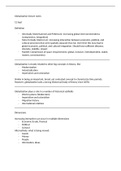Globalization lecture notes
12 Sept
Definition
- Informally (Osterhammel and Petterson): increasing global interconnectedness
(compression, integration)
- More formally (Held et al.): increasing interaction between economic, political, and
cultural processes that were spatially separate thus fat. Over time this may lead to
global economic, political, and cultural integration. Should have sufficient distance,
intensity, stability, impact
- Martell: Compression of space (requirements: global, inclusive, interdependent, stable,
masses, consciousness).
Globalization is closely related to other big concepts in history, like
- Modernization
- Industrialization
- Imperialism and colonialism
Similar in being an important, broad, yet contested concept to characterize time periods.
However, globalization lacks a strong (historical) body of theory since 1870s
Globalization plays a role in a number of historical subfields
- World systems (Wallerstein)
- Imperialism and colonialism
- Migration history
- International relations
Dimensions
Increasing interaction can occur in multiple dimensions
- Economic (trade, finance)
- Political
- Cultural
Alternatively, what is being moved:
- Goods
- Money
- People
- Information, ideas
,A very complex interaction between all
Cultural and economic globalization: people
Cultural globalization: cuisines
Economic globalization: money, information
Importance
- Countries have grown ever more connected with rest of world, important for their
development and your understanding of it. For example, compare North and South
Korea
- Interconnected world is at once crucial for modern life, but also fragile, think of the
Covid supply chain shocks or the disruptions due to Ukraine war.
- Governance is also globalizing: competitive nation states have made way for
institutionalized international “cooperation” (way more complex in real-life, bit
outdated view)
- International cooperation and exchange are more important than ever, but not
governed by enforceable rules and a central authority, which makes them fragile.
Early Eurasian integration
- McNeill and McNeill: globalization as old as human settlement
- Regular exchange of goods between major centers of Eurasia well before year 0
- As Han-Dynasty (206BC-220AD) expands westwards and Roman Empire expands
eastwards, Eurasian trade becomes more regular (first Silk Road)
- Does this qualify as globalization to you?
Early Eurasian integration before 1500
- Mongol rule/unification (106-1368) enable prolonged exchange between Europe and
East Asia – The Silk Road
- At the same time, shows limits of early Eurasian globalization
- Transport of goods takes years and some ideas move very slowly or not at all
- Limited technological progress possible in overland transport (technological
developments enables globalization)
, - Key determinant is (international) political stability, very scarce in those days
Gutenberg printing press c. 1454
Early modern globalization from 1500
- Journeys by Da Gama (1497-99), Columbus (1492), Magellan (1519-1522)
- Goal is to directly reach spice islands and Indies by sea-> economic integration
- Speed-up in globalization process in other ways as well
- Greatly expanded knowledge about world
- Spread of Christianity to Americas
- Integrated Americas in world system
- Great ecological impact, especially in Americas
Early modern globalization from 1500
- Traditional view: mainly market in luxuries (elites), “main street” economy probably
much less affected
- Communication still very slow (letter from Amsterdam to Batavia 0.75 year; 2 years to
reply)
- Limited scope for coordination, planning, and control
- Limited market integration (though alternative view on that next week)
- However: Huge ecological and cultural impact on Americas
19th century (first global era)
- Further acceleration of globalization process from c. 1850 onwards – “first global
century”
- Trade, migration, capital market integration very high; in some aspects more so than
today
- Markets integrated beyond luxuries (elites), including mass consumption items like
grain, meat, cotton textiles
- Affected wages, land prices, etc. throughout world
- Driven by new technology (steam transport, ships, telegraph), institutions (free trade,
empire, Gold Standard) and politics
Deglobalization 20th century
, - Globalization of nineteenth century would not be permanent, however.
- First so-called backlash (policy backlash or globalization backlash)
- “Grain invasion” one of the first movers: cheap grain from USA lowers grain prices in
Europe
- Land-owning nobility and newly enfranchised framers resist this (Farmers tried to vote
and unite to stop the grain import); tariffs rise once more
- WWI, Depression and subsequent protectionism, as well as rise of planned economies
striving for autarky, diminish global integration further.
Contemporary globalization
- Cautious reconstruction of world trade and globalization after 1945
- Institutionalization (GATT/WTO, IMF, World Bank, UN)
- Some protectionism allowed, especially capital controls
- Central role for US economy
- Enabled strong recovery and economic growth in capitalist West (“golden age of
capitalism”) in 50s and 60s
- System breaks down in 70s (end Bretton Woods (some regulation of the market); Oil
crisis)
Contemporary globalization
- New system from 70s onwards: Hyperglobalization
- New technologies allow faster communication, cheaper shipping, faster transportation
(80 days to 30 hours)
- Liberal revival (neoliberalism) due to disillusion with Keynesian policy in 70s
- Overall move towards deregulation of economy
- With it, trade barriers and, especially, capital controls also go (latter move to stimulate
financial centers in US and UK): becomes goal rather than means to an end
- EU, fall communism, Deng Xiaoping’s reforms contribute as well
- At start of 21st century, globalization surpasses 19th century-highs in many aspects
(though not all)
- Is globalization currently breaking down again?
Driving forces of the globalization process
A number of forces driving globalization can be distinguished
- Politics, institutions, trust
- Technology
- Organizations




